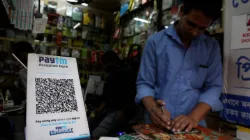Paytm receives approval from RBI to onboard new UPI users
Earlier this year, the Reserve Bank of India (RBI) directed Paytm to halt several of its financial services due to repeated regulatory violations. Following the ban, Paytm requested approval from the National Payments Corporation of India (NPCI) in August.

India's leading financial services firm, Paytm, recently announced that it has been granted approval by the National Payments Corporation of India (NPCI) to onboard new unified payment interface (UPI) users. This development comes as a relief for Paytm after its banking unit faced a ban ordered by the central bank earlier this year. Paytm had submitted a request to NPCI in August, and the approval has now been granted.
The ban on Paytm's banking unit was initiated by the country's financial regulator in January due to ongoing compliance issues. This move had raised concerns about the future of Paytm's digital payments business and had a significant impact on the company's stock value.
RBI made changes in UPI transaction limits
In other news, the Reserve Bank of India (RBI) has increased the limits for UPI Lite and UPI 123PAY transactions. The limit for UPI Lite transactions has been raised from Rs 500 to Rs 1,000, and the wallet limit has been increased from Rs 2,000 to Rs 5,000. Additionally, the limit for UPI 123PAY transactions has been doubled from Rs 5,000 to Rs 10,000.
These changes, announced as part of the development and regulatory framework, are aimed at facilitating digital transactions. The RBI governor emphasized that the goal is to encourage broader acceptance of UPI and make it more inclusive by increasing the limits on a case-by-case basis.
What is UPI Lite?
UPI Lite allows users to make small payments without entering a UPI PIN. The previous transaction limit of Rs 500 has been raised to Rs 1,000, and the wallet capacity has been increased to Rs 5,000. Users are required to fund their UPI Lite wallet for PIN-free transactions.
UPI 123PAY
Launched in March 2022, UPI 123PAY enables feature phone users to make digital transactions. With the update, users can now make payments of up to Rs 10,000 per transaction. UPI 123PAY supports various payment methods, including customized IVR numbers, missed calls, OEM-enabled payments, and voice-based technology.
